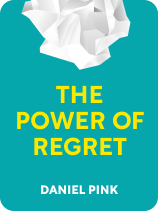

This article is an excerpt from the Shortform book guide to "The Power of Regret" by Daniel Pink. Shortform has the world's best summaries and analyses of books you should be reading.
Like this article? Sign up for a free trial here.
What are the different types of regret? What are the most common regrets people have in life?
In his book The Power of Regret, Daniel Pink argues that most of the regrets people have in life fit into one of four categories. Pink derives these categories from a broad national survey asking people to share their regrets.
Here’s a look at the four main types of regret.
Regret Category #1: Stability
The first of four types of regret is stability. Stability regrets occur when people wish they’d done more to invest in creating a stable life for themselves. People experience stability regrets when they realize the destabilizing consequences of their lifestyle late in life and wish they could go back and adopt different habits or attitudes in the past. Common stability regrets include wishing that they had taken better care of their physical health, invested more in their education and skill development, or handled money more responsibly.
(Shortform note: In considering stability regrets, it helps to understand the role of social comparison in regret formation. Researchers have found that you’re more likely to regret a perceived failure if you see others who have achieved what you want. For example, you may be more likely to regret not making money if you have wealthy friends, or to regret not exercising if your friends are all physically fit.)
Regret Category #2: Ethics
People experience ethical regrets when they feel they’ve acted against their personal code of ethics. These are regrets of things done more often than regrets of things not done, as people reflect on their moral transgressions. However, some people have ethical regrets of things not done as they look back on missed opportunities to serve their communities or stand up for their values.
The most common ethical regrets voiced by participants in Pink’s survey were bullying and infidelity. Many participants also regretted having abortions or missing out on the opportunity to serve their countries through the military or other branches of national service.
(Shortform note: To understand how ethical regrets can be so long-lasting and painful, it helps to explore “decision-justification theory.” Psychologists studying regret propose that our ability to justify the decision we regret determines the intensity of our feelings of regret: If we have a good justification for the regretted decision, the regret won’t feel as intense. However, if we lack a justification, we will feel the regret more intensely. This explains why ethical regrets can be some of the most painful: Because people have violated their own code of ethics, it becomes much harder to justify the decision, leading to a more intensely felt regret.)
Regret Category #3: Bravery
People experience bravery regrets when they fail to take a risk that is important and meaningful to them. These are almost always regrets of things not done, as people look back on their lives and wish they’d taken a risk to do something they really wanted instead of playing it safe. They imagine how their lives would be different if they had followed their dream and see a loss of growth and potential.
People with bravery regrets may wish they had started a business, invested themselves more fully in passions like music or art, chosen a more ambitious career path, or made a big life decision like moving to a new country.
(Shortform note: Psychologists have found that bravery regrets often stem from a person’s failure to live up to their “ideal self.” The theory of the ideal self stems from the work of psychologist Carl Rogers, who maintained that each person has an ideal self (who they want to be) and a self-image (who they think we really are). Rogers argues that people suffer from low-esteem when there is a substantial difference between their ideal self and their self-image. Therefore, if you find yourself experiencing a lot of bravery regrets, the problem might be how you view yourself right now instead of what you did or didn’t do in the past.)
Regret Category #4: Relationships
People experience relationship regrets when they feel they’ve missed an opportunity for a meaningful connection with someone. They compare the life they have without an important person—a friend, family member, or romantic partner—and imagine the life they could have had with this relationship.
Relationship regrets can be either regrets of things done or regrets of things not done. Some people lose relationships because of an action they took, such as starting a fight or pushing someone away out of anger. Others may lose relationships simply because they failed to invest as much as they wanted to and drifted apart over the years.
Relationship regrets are the most common type of regret reported on Pink’s survey. Psychologists have identified quality relationships as the most important predictor of someone’s mental and emotional well-being. Therefore, people feel a great sense of loss at missing out on important relationships, leading them to experience regret.
(Shortform note: Researchers have found that people often feel regrets about relationships more intensely than regrets about domains like career or education. Psychologists attribute this not just to a need for connection but also to a fundamental need for belonging. Because humans are social by nature, anything that threatens our belonging within a group also threatens our sense of safety. Therefore, lost relationships may threaten our sense of well-being more than other missed opportunities in life.)

———End of Preview———
Like what you just read? Read the rest of the world's best book summary and analysis of Daniel Pink's "The Power of Regret" at Shortform.
Here's what you'll find in our full The Power of Regret summary:
- A look at why most people feel regret, and what causes it
- The three worst ways to deal with regrets
- The five-step process for turning regrets into advantages






